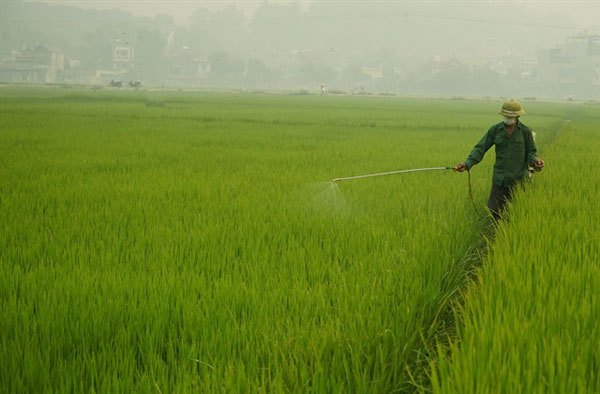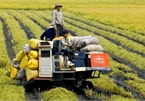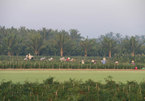 |
|
A farmer in the northern mountainous province of Dien Bien sprays pesticide on winter-spring rice fields. |
The minister requested agriculture sectors in localities to enhance measures to prevent the outbreaks of harmful insects and their impacts on the rice crop.
Up to now, rice fields were developing well but agricultural authorities urged a close watch on weather developments.
Since late last month, the cold weather with high humidity and prolonged drizzle typical of late spring was favourable conditions for harmful insects which could spread the diseases on rice.
This year, the northern provinces had cultivated 1.1ha of the winter-spring crop.
“This crop was very important because it accounted for 60 per cent of yearly yield,” Cuong said.
“This time was a sensitive moment for the success of the crop,” he said.
According to the ministry’s Plant Protection Department, the rice fields in the north-central region, including provinces of Thanh Hoa, Nghe An, Ha Tinh, Quang Binh, Quang Tri and Thua Thien-Hue, were at high risk of đạo ôn (rice blast) disease, one of the most dangerous diseases to rice crops, which is caused by the pyricularia oryzae fungus.
At present, 3,600ha of rice in the region was infected with some light diseases.
In the Hong (Red) River delta and northern mountainous regions, the rice blast disease will break out and badly damage the rice crop from mid-April till mid-May.
About 5-20 per cent of the crop will be attacked by the disease, the department said.
Meanwhile, rầy nâu insect (a kind of grasshopper) will destroy large areas of rice crop in many provinces, especially in the Hong River Delta region, till early next month.
At present, more than 1,100ha of rice fields in the Hong River Delta region have been damaged by the grasshopper, said the department.
In order to protect the winter-spring crop and ensure national food security, Minister Cuong asked provincial people’s committees to drastically implement the directive on strengthening harmful insect prevention on the winter-spring crop in northern provinces.
Besides, the local authorities were asked to closely monitor development of harmful insects on other crops of maize and cassava to avoid disease outbreaks. — VNS

Challenges compel restructuring in agriculture
Trade conflicts, climate change and epidemics may at first glance appear to be a hindrance to Viet Nam’s agricultural sector.

Rice farmers switch to corn as fresh water supply shrinks
Facing water shortages, farmers in the Cuu Long (Mekong) Delta province of Tien Giang have grown corn on nearly 2,000ha of rice fields for the 2018-19 winter-spring crop.
 The changing seasons' weather brings a high risk of disease outbreaks to the winter-spring rice crop in the northern provinces, said Minister of Agriculture and Rural Development Nguyen Xuan Cuong.
The changing seasons' weather brings a high risk of disease outbreaks to the winter-spring rice crop in the northern provinces, said Minister of Agriculture and Rural Development Nguyen Xuan Cuong.